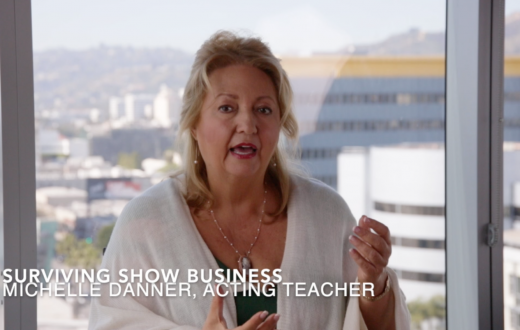If you’ve ever participated in a talk-back after performing in a stage show, you’ve surely experienced this: you’re up there, seated on stage, sweaty, elated and still bathed in the glow of the post-performance high. You’re not only willing, you’re downright eager to engage the curious patrons who remain in an in-depth analysis of your character arc, your process, the history of the play and the playwright, etc.
And you get this question: “How do you remember all those words?”
Well…you just do, lol.
Hey, no, in all honesty, it’s great to have audience members who are interested! But the truth is that memorization, as every actor knows, is a very preliminary, very rudimentary step in the work you have to put in to fully bring a character to life. It’s like asking a bodybuilder, “How do you get all those weights onto the barbell before you lift?”
However, some of us struggle with memorization more than others, especially under extremis. There’s nothing like the pressure of getting sides the night before an important audition for testing your memorization process. So while memorization is surely something we all know how to do, here are a few useful tips that can help speed up the process if you find it a challenge.
1. Focus
If you’re under the gun to memorize sides for an audition and you think you’re going to be able to do so effectively while watching TV, intermittently texting your friends, and checking out Facebook and Snapchat, you are sadly mistaken. Sure, there are people who thrive under this kind of ADHD nightmare chaos. But I think we can all agree, even they would get more done more cleanly and quickly if they reduced the distractions. Get somewhere quiet, turn off your phone, and devote a solid block of time to working on your sides. There’s no substitute for focus, especially when the mind is already under stress due to the time crunch you’re under. If you’re still one of those people who has a hard time focusing, look up the Pomodoro Technique. It sounds simple but it really works!
2. Don’t memorize
…at least not yet. Just read through the material out loud, all of it, from top to bottom, several times. Maybe twenty or more times all the way through. The idea right now is just to get familiar with the scene, to get a sense of the flow of the piece, and especially the feel of the words in your mouth. As you go over it and over it, you start to notice how one word connects with or flows into another. You also begin to notice how the ideas flow into one another–or, conversely, how they conflict. The other thing you’ll start to notice is you will begin to memorize without actually trying to! But don’t get hung up on that right now. Just relax and let yourself absorb the material naturally. Hey, Anthony Hopkins claims to read an entire script at minimum 150 to 200 times before he even begins memorizing–surely you can manage 20 times through a single scene!
3. Find a friend
If you’re going to be reading a scene for your audition, you’ll need to hear your scene partner’s sides out loud. It’s just as important to be familiar with your cues as it is to be familiar with your own lines, of course–because as we all know, acting is listening. This means you should try your best to enlist the aid of a friend who can spend some time with you working through the sides line by line, beat by beat. It’s a good idea to make a pact to be “audition buddies” with an actor friend, a deal wherein you each commit to helping the other when he or she has sides to memorize before an important audition. If this is impossible, try using the audio recording app on your phone. Record your opposite’s lines leaving enough space for you to respond with your own lines in between, and go to town, talking to yourself! No, the truth is that hearing the cue lines rather than just reading them is invaluable when it comes to memorization. You develop an almost Pavlovian response to the cue words that very nearly force your own lines out of you involuntarily. You can use this method while doing almost anything: washing dishes, walking the dog, driving to work, running on the treadmill–you name it. And every little bit helps!
4. Move it
I’ve worked with actors who really can’t even begin to memorize until the blocking process has been locked down. They just need the movements they are doing to match up to the words they’re saying before either can be fully internalized. This may be extreme for some of us, but once you reach the point where you’re working the lines back and forth with a scene partner or your trusty iPhone, you should definitely be up on your feet as much as possible. As you work the lines, move around the room and picture the scene. Picture the era, the time of day, the time of year. Do your best to glean from the text and stage directions how and where you might move as a result of the words you say–how do your lines impel you: toward your scene partner, away from them? This isn’t to say that you should use all of this “self-blocking” in the actual audition, but studies show that movement aids a person’s ability to remember a subsequent line. And a repeated action when saying a line over and over again will really cement the words home for you.
5. Trust yourself
The most important factor in successful memorization–as in every other aspect of acting–is to be grounded, relaxed and confident. The nervous, flustering “pre-freakout” some of us feel when on the way to an audition for which we are supposed to be off-book does you no good at all, and is in fact detrimental. Now, of course anxiety is something easily diagnosed but not easily overcome. However, if you do the work, stay grounded in yourself and find the character, you should be able to focus on what the character wants in the scene and how you can play his or her actions rather than on the myriad of possible things that could go wrong for you the actor. Ultimately, the words don’t matter as much as the intention: remember the old saw that acting is about action. Have fun, be engaged with the character and with the reader you’re working with, and allow yourself space to play, free from self-judgment and recrimination, and that positive energy will manifest itself for the casting team!







